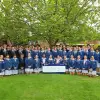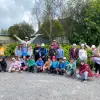A Legacy of Sporting Excellence
Article by Nicholas Foster, Director of Grammar Enterprise
Launceston Grammar has a proud and enduring tradition of student participation in sport.
We believe that sport offers an opportunity to develop camaraderie and esprit de corps. From the joy of a student’s first steps onto the playing field to the remarkable achievements of alumni who have represented Australia at the Olympic and Commonwealth Games, competed in The Ashes and Wimbledon, swum the English Channel, and played at the highest levels of AFL and other professional sports – our community continues to strive and also excel.
As part of our Strategic Directions 2024–2029, Launceston Grammar is committed to intentionally supporting High Performance Sport.
This initiative is designed to nurture and empower students who aspire to compete at elite levels, providing them with the environment, resources, and guidance needed to thrive.
In 2025, we proudly launched High Performance Tennis, a program aimed at supporting talented tennis players within our school. This marks a significant step in our broader vision to implement systems and structures that enable student-athletes to pursue excellence in their chosen disciplines. As we move into 2026 we are looking at ways to support all students pursuing sport at the highest levels to create an environment that best supports their wellbeing and training.
To better understand how this vision is being brought to life each day, we spoke with three of our coaches, dedicated professionals who are shaping the next generation of student-athletes at Grammar.
TENNIS
Jason Fletcher, High Performance Tennis Coach
Q. Tell us about your coaching role here at Grammar and how it aligns with the High Performance program.
A. My coaching role here at Grammar is very diverse. It involves taking our already talented tennis students to the highest level attainable through dedicated individualised training and structuring not only their full training week but also their extensive national and international tournament schedules. Combining this with the incredible academic offerings that we have at the School allows us to help foster well balanced and successful students.
Q. What first drew you to coaching tennis, and what motivates you to continue in this role?
A. A deep love and passion for the sport first drew me into coaching and provided numerous magical experiences that I’ve been able to share with friends and family. The opportunity to now guide multiple students into similar experiences and see them continue to grow is what really motivates me. I am really grateful for our achievements as a team and the incredible opportunities we share.
Q. What aspects of tennis do you focus on that you believe are key to student athletes development - physically and mentally?
A. Our main focus for a student’s overall development is consistent monitoring of all aspects of their training: physical, mental and technical. Planning and regularly adapting to each student’s needs allows us to guide them on the optimal performance path. Having a clear structure and focus on development over performance also alleviates pressure and allows us to bring them closer to their full potential.
Q. How do you balance focusing on individual development with fostering teamwork in a sport like tennis?
A. Tennis can be a lonely sport if you don’t have a team, so creating and maximising team experiences, and allowing time to reflect on them, is an important benefit of our environment for both our athletes and their families. Balancing our individual and team goals allows us to unite the two together and create something deeper and more meaningful than a simple win or loss.
Q. What values do you hope to instill in your players, both on and off the court?
A. We aim to see our athletes embrace every opportunity with confidence and a growth mindset, allowing them to forge their own path within a team environment. We want them to always be respectful, appreciative and grateful for the efforts of those around them towards shaping their future. Finally, we hope they will value giving back to the communities they have been involved in, whether in words or actions.
ATHLETICS
Liz Gray, Athletics Coach
Q. What drew you to athletics coaching, and what do you find most fulfilling about it?
A. Having competed in athletics for over 20 years, when I started teaching I was put in charge of the athletics program, and started my own squad at the request of friends. What I find most fulfilling is seeing an athlete achieve the goals they have set for themselves and worked hard towards, and the joy and confidence that success brings them.
Q. How do you ensure that athletes are not only improving their performance but also learning about their potential and self-discipline?
A. I see every training session as an opportunity to educate the athletes on strategies to help them achieve their potential, and check in on how they are going towards their training targets. Instilling confidence in what they can realistically achieve and endeavouring to get to know the athletes as people is vital. I also meet formally with each senior athlete to review each season and set new goals.
Q. How do you approach coaching such a diverse range of events in athletics?
A. Training programs are tailored to individual events and the age of the athlete, so there’s quite a lot of individualisation. However, I generally only coach track events, and there is some overlap in requirements for each event in athletics, so, for example, all athletes will work on maximal speed.
Q. How do you balance pushing athletes to achieve their best while ensuring they avoid burnout or injury?
A. In addition to closely monitoring each athlete, I try to educate them to listen to their bodies and take short breaks to allow niggles to settle as needed. As a coach, it’s important to have an understanding of their training loads from other sports and the things going on in their lives that may impact their athletics. My philosophy is to encourage age-appropriate training which focuses on quality over quantity, as this also reduces injury risk.
Q. Looking ahead, what are your goals for the athletics program at the school?
A. My goals are to help individuals develop their technique and abilities in their chosen events or sport, and to continue to strengthen the overall athletics program with an increase in participation in all its aspects.
ROWING
Sarah Ashlin, Head of Rowing
Q. Can you tell us about your background in rowing and how that experience shapes your coaching approach today?
A. I’ve been involved in rowing for 10 years, both as an athlete and as a coach. I competed nationally and had the privilege of training under some exceptional coaches who instilled in me a deep respect for the process, discipline, and team spirit that rowing demands. That experience shaped how I coach today – I believe in a technical and athlete-centred approach that combines high standards with strong support. I draw from my own time in the boat to connect with athletes, helping them understand not just how to move a boat efficiently, but how to think and lead like rowers to ensure the best outcomes for the whole crew.
Q. What have been some of the most defining moments in your own rowing or coaching career?
A. A few moments stand out – competing for Tassie in a national competition at home and achieving podium finishes at national events are career highlights as an athlete. As a coach, helping crews achieve milestones they didn’t think possible has been incredibly rewarding. One defining moment was guiding a young, relatively inexperienced crew to a State Championship. What was incredible was not only the support the rowers in the boat showed one another, but also the support shown by the wider crew. Those moments when a team discovers its collective strength and the joy of sharing in each other’s success stay with you.
Q. How do you build a strong team culture in rowing, given the sport’s emphasis on individual and group performance?
A. Rowing is unique – it demands individual excellence within a team built on strong mutual support. Building culture, particularly in rowing, starts with shared values, including accountability, resilience, and mutual respect. I work hard to create an environment where every athlete feels their role is vital, whether they’re in the first boat or just starting out. We celebrate progress, not just performance, and emphasise that the crew moves forward when every individual commits to the standard and supports one another, both on and off the water.
Q. What strategies do you use to prepare students for the physical and mental demands of the sport?
A. Consistency is key, with an emphasis on process over outcome. We train not just to build strength and endurance, but to develop habits – recovery, nutrition, time management – that support long-term growth. We use goal setting, and individual and crew reflection to help athletes build confidence and resilience. I also encourage open communication and make athlete wellbeing a visible part of our program – it’s not just about how hard we can push, but how smartly and sustainably we can grow.
Q. What do you hope every student takes away from their time in the rowing program?
A. My hope is that every student leaves the program not only physically stronger, but with a clearer sense of who they are and what they’re capable of. Rowing teaches discipline, humility, and perseverance – qualities that extend well beyond the boat. I want them to remember what it felt like to be part of something bigger than themselves, to face setbacks and rise, and to carry that confidence and grit into whatever challenges lie ahead.



